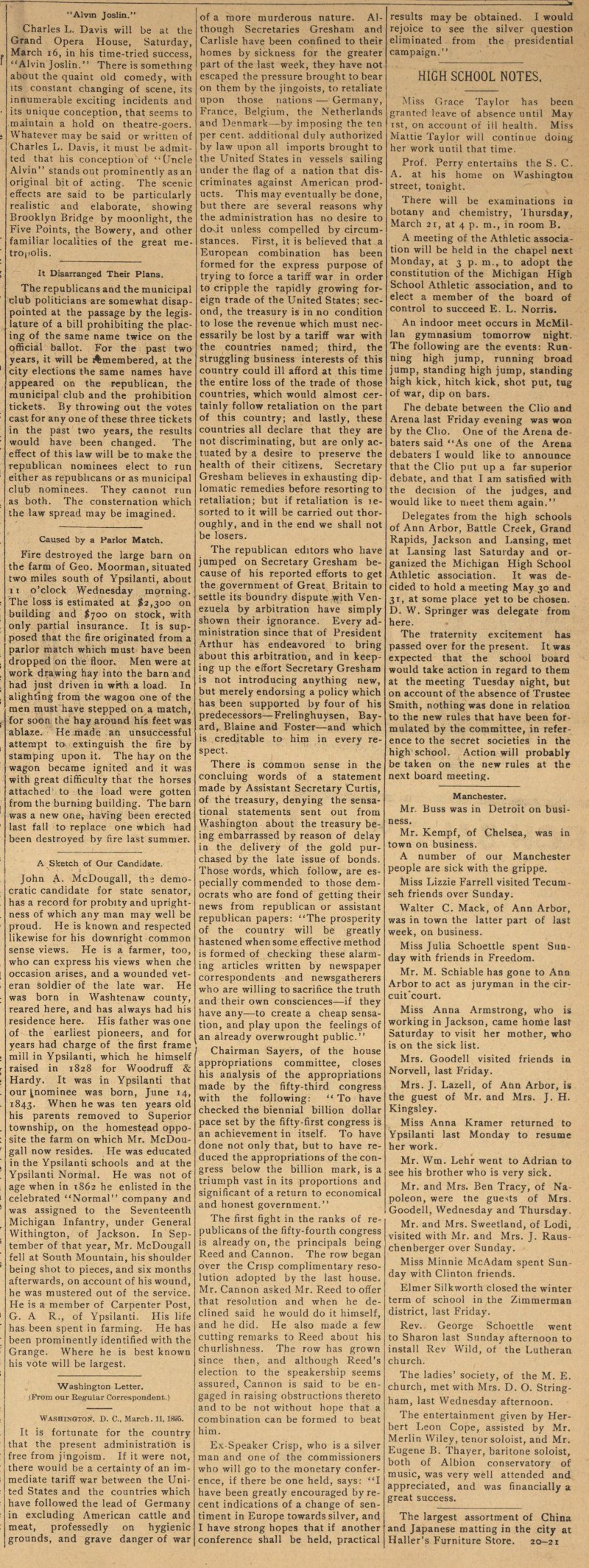Washington Letter

i Froin our Regular Correspondent.) Washington, D. C, Murch. 11, 1895. It is fortúnate for the country that the present administrador! is free from jingoism. If it were not, there would be a certainty of an immediate tariff war between the United States and the countries which have followed the lead of Germany in excluding American cattle and meat, professedly on hygienic grounds, and grave danger of war I of a more murderous nature. AIthough Secretarles Gresham and Carlisle have been confined to their homes by sickness for the greater part of the last week, they have not escaped the pressure brought to bear on them by the jingoists, to retalíate upon those nations - Germany, France, Belgium, the Netherlands and Denmark - by imposing the ten per cent. additional duly authorized by law upon all imports brought to the United States in vessels sailing under the tlag of a nation that discriminates against American products. This may eventually be done, but there are several reasons why the administration has no desire to doit unless compelled by circumstances. First, it is believed that a European combination has been formed for the express purpose of trying to forcé a tariff war in order to cripple the rapidly growing foreign trade of the United States; second, the treasury is in no condition to lose the revenue which must necessarily be lost by a tariff war with the countries named; third, the siruggling business interests of this country could ill afford at this time the entire loss of the trade of those countries, which would almost certainly follow retaliation on the part of this country; and lastly, these countries all declare that they are not discriminating, but are only actuated by a desire to preserve the health of their citizens. Secretary Gresham believes in exhausting diplomatic remedies before resorting to retaliation; but if retaliation is ïesorted to it will be carried out thoroughly, and in the end we shall not be losers. The republican editors who have jumped on Secretary Gresham because of his reported efforts to get the government of Great Britain to settle its boundry dispute with Venezuela by arbitration have simply shown their ignorance. Every administration since that of President Arthur has endeavored to bring about this arbitration, and in keeping up the eifort Secretary Gresham is not introducing anything new, but merely endorsing a policy which has been supported by four of his predecessors - Frelinghuysen, Bayard, Blaine and Foster - and which is creditable to him in every respect. There is common sense in the concluing words of a statement made by Assistant Secretary Curtis, of the treasury, denying the sensational statements sent out from Washington about the treasury being erabarrassed by reason of delay ia the delivery of the gold pur chased by the late issue of bonds. Those words, which follow, are especially commended to those democrats who are fond of getting their news from republican or assistant republican papers: "The prosperity of the country will be greatly hastened whensome effective method is formed of checking these alarming articles written by newspaper correspondents and newsgatherers who are willing to sacrifice the truth and their own consciences - if they have any - to créate a cheap sensation, and play upon the feelings of an already overwrought public." Chairman Sayers, of the house appropriations committee, closes his analysis of the appropriations made by the fifty-third congress with the following: " To have checked the biennial billion dollar pace set by the fifty-first congress is an achievement in itself. To have done not only that, but to have reduced the appropriations of the congress below the billion mark, is a triumph vast in its proportions and significant of a return to economical and honest government." The first fight in the ranks of republicans of the fifty-fourth congress is already on, the principáis being Reed and Cannon. The row began óver the Cnsp complimentary resolution adopted by the last house. Mr. Cannon asked Mr. Reed to offer that resolution and when he declined said he would do it himself, and he did. He also made a few cutting remarks to Reed about his churlishness. The row has grown since then, and although Reed's election to the speakership seems assured, Cannon is said to be engaged in raising obstructions thereto and to be not without hope that a combination can be formed to beat him. Ex-Speaker Crisp, who is a silver man and one of the commissioners who will go to the monetary conference, if there be one held, says: "I have been greatly encouraged by recent indications of a change of sentiment in Europe towards silver, and I have strong hopes that if another conference shall be held, practical results may be obtained. I would rejoice to see the silver question eliminated from the presidential campaign."
Article
Subjects
Ann Arbor Argus
Old News